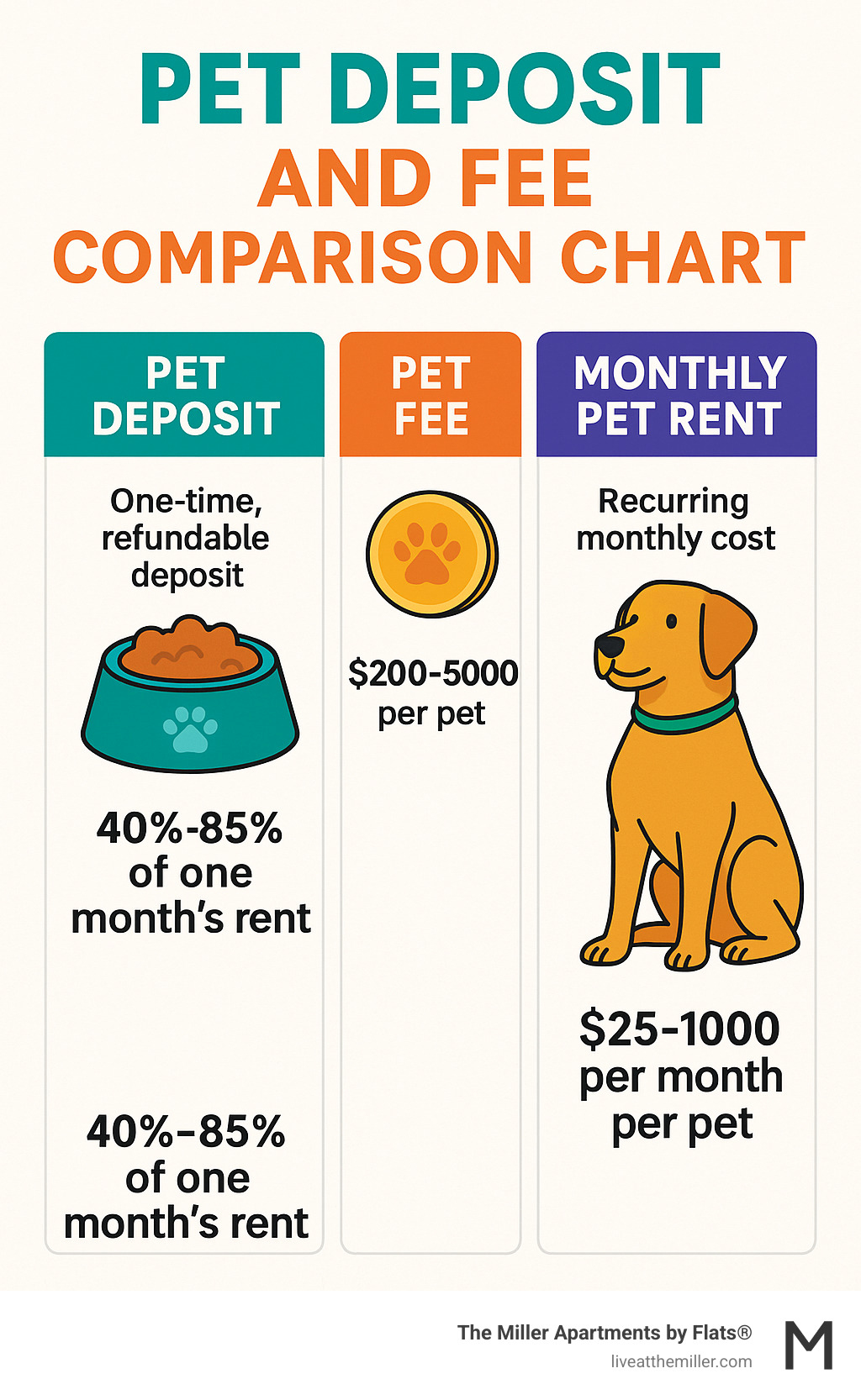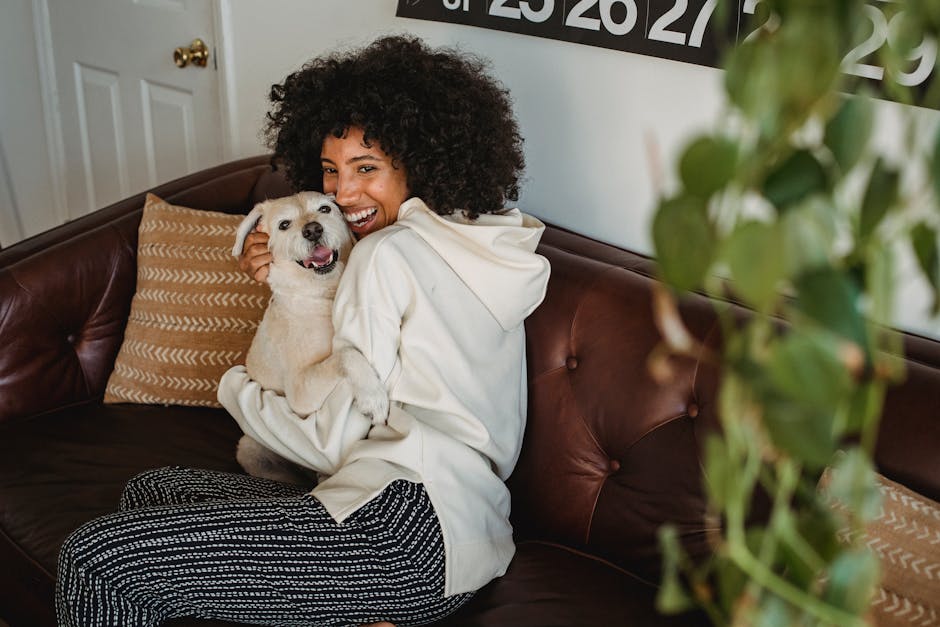Finding a Pet-Friendly Home for Your Large Dog
Apartments allowing large dogs are available, though they require some strategic searching. Here's what you need to know to quickly find a home for your larger furry friend:
- Look for properties that advertise "all breeds welcome" or specifically mention large dog acceptance
- Expect weight limits between 25-50 pounds at most standard apartments
- Prepare to pay additional pet deposits and possibly monthly pet rent
- Consider individual landlords over corporate complexes for more flexibility
- Create a "pet resume" showcasing your dog's training and temperament
Finding the perfect apartment can be challenging enough, but when you add a large, lovable canine companion to the equation, the search can feel overwhelming. Many apartment communities impose weight limits between 25-50 pounds or restrict certain breeds, leaving owners of gentle giants scrambling for housing options.
The good news? The rental landscape is evolving. More property managers are recognizing that a dog's temperament matters more than its size or breed. Some communities, like Dane Park North Garland, now accept all breeds and sizes, allowing up to three dogs per apartment after a simple temperament test.
While the search requires extra effort, you don't have to choose between your four-legged family member and a great place to live. With the right approach and preparation, you can find a comfortable home where both you and your large dog will be welcomed.
What Counts as a "Large Dog" & Why It Matters
When you're scrolling through rental listings with your furry friend snoozing at your feet, understanding what property managers consider a "large dog" can save you tons of heartache and wasted application fees. In the rental world, size classifications aren't just arbitrary labels—they directly determine which doors will open for you and your canine companion.
Most apartment communities draw their line in the sand based on weight rather than height or breed. The magic number typically falls somewhere between 25-50 pounds, with many properties setting their cutoff at 35 pounds. This means those lovable Labrador Retrievers, German Shepherds, and Golden Retrievers—who commonly tip the scales at 60-90 pounds when fully grown—find themselves on the wrong side of many apartment policies.
But why these limitations? Property managers often point to several concerns:
- Potential property damage: Those big paws and wagging tails might cause more wear and tear
- Noise concerns: Bigger vocal cords can mean louder barks that travel through walls
- Insurance requirements: Many property insurance policies charge higher premiums or refuse coverage for certain large breeds
- Space considerations: The worry that larger dogs need more room to thrive than apartment living provides
The frustrating reality? These concerns often stem from broad generalizations rather than looking at individual dogs. Your perfectly mannered Great Dane might be quieter and gentler on your apartment than your neighbor's spirited Jack Russell Terrier, but blanket policies rarely account for these personality differences.
Typical Weight/Breed Cutoffs in Apartment Pet Policies
When hunting for apartments allowing large dogs, knowing what you're up against helps set realistic expectations. Most standard apartment communities implement some combination of these limitations:
The average weight restriction hovers between 25-50 pounds, with many properties drawing their line at 35 pounds. Breed restrictions often target dogs with unfair reputations—Pit Bulls, Rottweilers, German Shepherds, Doberman Pinschers, Akitas, and wolf-hybrids frequently appear on "not welcome" lists. And even if your dog passes both those tests, many properties cap residents at two pets per apartment.
These restrictions typically stem from insurance requirements rather than manager preferences. Insurance companies often refuse coverage for properties allowing certain breeds or charge significantly higher premiums, which properties then pass along to pet owners through higher deposits and fees.
Size misconceptions play a major role too. Some property managers assume all large dogs are automatically destructive or aggressive, despite overwhelming evidence that temperament varies dramatically by individual dog rather than size or breed.
Safety concerns, while sometimes valid, often rely on outdated information. Veterinary behavioral experts consistently report that breed is a poor predictor of aggression or behavior problems. Your dog's individual temperament, training history, and socialization matter far more than their size or breed label.
Fortunately, forward-thinking communities (like The Miller) are shifting toward temperament-based assessments rather than arbitrary weight or breed restrictions. These properties evaluate each dog individually through meet-and-greets or behavioral assessments, allowing well-behaved large dogs to find their perfect home regardless of size or breed classification.
Apartments Allowing Large Dogs: Availability & How to Locate Them
Finding apartments allowing large dogs feels a bit like searching for hidden treasure—challenging but completely possible with the right map. The rental landscape has actually become more pet-friendly over the past decade, with more than half of available rentals in major cities like Chicago, Los Angeles, and San Francisco now accepting pets in some form.
The catch? When you filter for places that welcome larger breeds without strict weight limits, your options shrink to about 20-30% of those pet-friendly listings. But don't get discouraged! Some forward-thinking communities specifically roll out the welcome mat for big dog owners, recognizing that responsible ownership matters far more than arbitrary size restrictions.

Geography plays a surprising role in your search success. West Coast cities like Portland, Seattle, and Vancouver tend to be more accommodating to your four-legged friends of all sizes. You'll generally find more flexibility in suburban areas compared to city centers, and newer luxury developments often include amenities specifically designed with larger breeds in mind.
The Miller Apartments in Vancouver, WA exemplifies this modern approach, offering genuinely pet-friendly living in a stunning waterfront location. Their philosophy focuses on responsible pet ownership rather than arbitrary size restrictions—making life much easier for you and your canine companion.
Using Search Filters to Uncover "Apartments Allowing Large Dogs"
Mastering online rental platforms is your first step toward finding apartments allowing large dogs. While most sites offer basic pet filters, you'll need to dig deeper:
Start with the standard "pet-friendly" filter, but don't stop there. Look specifically for weight limit specifications or "no weight restrictions" options when available. Since online listings aren't always updated with current pet policies, make direct contact with promising properties to verify their exact rules.
Set up saved searches with your pet criteria so you'll receive alerts when new dog-friendly options hit the market. This proactive approach can help you be first in line for those coveted large-dog accommodations.
When searching maps, be open to expanding your radius a bit. Sometimes going just a few miles beyond your target neighborhood can reveal hidden gems with more flexible pet policies.
For those specifically seeking Dog Friendly Rentals in Vancouver, The Miller Apartments offers an exceptional option with amenities designed with dogs of all sizes in mind.
Many apartment search websites like Apartment List offer specialized filters for pet-friendly searches, allowing you to narrow down options that welcome larger breeds.
Pro tip: When reaching out to properties, ask specific questions about weight limits, breed restrictions, and pet fees rather than simply asking if they're "pet-friendly." This targeted approach saves precious time and prevents disappointment later in the application process.
Beyond Complexes: Single-Family & Private Rentals
Sometimes the best apartments allowing large dogs aren't traditional apartments at all. Individual landlords often offer significantly more flexibility than corporate-managed complexes. These hidden opportunities include single-family homes with yards (paradise for large dogs), duplexes and triplexes typically owned by individuals, privately-owned condos for rent, and basement or in-law apartments with shared yard access.
Finding these gems requires different tactics than standard apartment hunting. Tap into neighborhood networks by telling friends, colleagues, and social connections about your search. Check both physical and online community bulletin boards where private landlords often advertise.
Don't underestimate the power of simply driving through neighborhoods you love, looking for "For Rent" signs. Many private landlords still prefer this traditional approach over online listings. You might also consider attending local dog events or visiting dog parks to connect with other large dog owners who might know of pet-friendly housing options.
When approaching individual landlords, come prepared to negotiate. Many will consider exceptions to their standard policies for responsible owners with well-trained dogs. Offering to meet in person with your dog, providing references from previous landlords, paying an additional security deposit, or signing a longer lease term can often convince hesitant property owners to welcome your larger companion.
These relationship-based approaches often yield better results than simply filtering through corporate listings, especially when landlords can see how well-behaved your furry family member truly is.
Costs, Legalities & Paperwork You'll Need
When you find those perfect apartments allowing large dogs, be prepared for some additional financial considerations beyond your standard rent. Understanding these costs upfront helps you budget realistically and avoid surprises during your move.

Most pet-friendly communities structure their fees in ways that protect their property while accommodating your furry family member. You'll typically encounter a combination of one-time and recurring charges. Pet deposits usually range from 40-85% of a month's rent and are potentially refundable when you move out (depending on your pup's behavior). Non-refundable pet fees might set you back between $200-500 per pet as a one-time payment.
Then there's the monthly pet rent – those recurring charges between $25-100 that add to your regular rent payment. Think of it as your dog's contribution to the household budget! While these fees might seem steep, they help property managers offset the additional wear and tear large dogs might cause over time.
The legal landscape around pet fees varies dramatically by state. Some states cap deposit amounts or require that pet deposits remain fully refundable, while others give landlords considerable freedom in setting their rates. It's worth researching your local regulations before beginning your search.
If you have a service animal or emotional support animal (ESA), different rules apply. Service animals trained to perform specific tasks for people with disabilities aren't legally considered pets under the Americans with Disabilities Act. This means they're exempt from pet fees and restrictions. ESAs that provide comfort for documented mental health conditions may also qualify for exemptions under the Fair Housing Act, though requirements for documentation have tightened in recent years.
Many properties also require pet liability insurance when you have a large dog. Coverage requirements typically range from $100,000 to $300,000. The good news is that many standard renter's insurance policies include pet liability coverage, though you might need to purchase additional coverage or specific endorsements for larger breeds.
When budgeting for your move, be sure to calculate both the initial hit (deposits and fees) and the long-term commitment (monthly pet rent). This gives you the true picture of what housing your gentle giant will cost over the life of your lease.
Building a Winning Pet Resume & Reference Packet
Creating a stellar pet portfolio can be your secret weapon in securing apartments allowing large dogs. This professional approach shows landlords you're a responsible pet parent before they even meet your four-legged friend.
Your comprehensive pet resume should showcase your dog's best qualities while addressing common landlord concerns. Start with the basics – your dog's name, age, breed, weight, and a flattering photo (professional quality, not just a cute selfie). Include up-to-date vaccination records to demonstrate proper veterinary care.
Training certificates make a powerful statement. Documentation of completed obedience classes or a Canine Good Citizen certification signals to property managers that your dog is well-behaved and properly socialized. These credentials can be particularly persuasive when you're trying to overcome breed or size restrictions.
References carry significant weight, especially from previous landlords who can confirm your dog didn't damage property or disturb neighbors. A letter from your veterinarian attesting to your dog's health and temperament adds another layer of credibility. Don't forget to include statements from neighbors, dog walkers, or pet sitters who can vouch for your pup's good behavior.
Proof of renter's insurance with appropriate pet liability coverage demonstrates financial responsibility and preparedness. Finally, include a brief, engaging biography of your dog that highlights positive traits – their quiet nature, gentle demeanor with children, or how they're perfectly house-trained.
Present all this information in a clean, organized format – either as a printed packet or a digital file that's easy to share. The goal is to transform perception: your large dog isn't a liability, but a valued community member who happens to have big paws.
By addressing potential concerns proactively, you'll stand out from other applicants and significantly improve your chances of finding a wonderful home where both you and your large dog will be welcomed with open arms.
Amenities & Lifestyle Checklist for Big-Dog Households
Finding apartments allowing large dogs is just the first step—you'll also want to ensure the community truly accepts your four-legged family member with amenities that make daily life comfortable and enjoyable for both of you.
Think about what your big pup needs to thrive in an apartment setting. Those daily walks, play sessions, and inevitable bath times after muddy trips all become much easier with the right amenities at your fingertips.

The most dog-friendly communities offer thoughtful features like on-site dog parks where your large breed can run freely without the hassle of a car ride. Properties with nature trails provide scenic routes for those essential daily walks, giving you both exercise and fresh air without navigating busy streets.
After a romp in the mud or rain (hello, Pacific Northwest weather!), pet washing stations become a sanity-saver. These dedicated cleaning areas keep your apartment pristine while making bath time less of a wrestling match in your personal bathroom.
For large dog owners, private outdoor space can be a game-changer. A balcony, patio, or small yard accessible directly from your unit means convenient potty breaks without the elevator wait or stair climb—especially helpful for middle-of-the-night emergencies or senior dogs with less bladder control.
The physical features of your actual unit matter too. Durable flooring that can withstand enthusiastic zoomies and the occasional accident will save you stress about potential damage. And if possible, ground-floor units eliminate the daily elevator dance with an excited 80-pound pup.
Don't overlook the importance of good soundproofing between units. Even the best-behaved large dogs occasionally bark at delivery people or make "big dog noises" that could disturb neighbors in poorly insulated buildings.
The Miller Apartments in Vancouver exemplifies this pet-friendly approach with their extensive community amenities designed with pets in mind. Their thoughtful approach includes designated pet areas and easy access to outdoor recreation, making life with your large dog both convenient and enjoyable.
Beyond your immediate living space, consider the surrounding neighborhood's pet-friendliness too. Is there an emergency vet within reasonable distance? Can you easily reach pet supply stores for those inevitable late-night food runs? Are there professional services like groomers, trainers, and doggy daycare options nearby? The ideal location combines these conveniences with access to public parks and pet-friendly businesses where your furry friend is welcomed, not just tolerated.
Red Flags and Questions to Ask on Tours
When touring apartments allowing large dogs, keep your detective hat on. Some communities may advertise themselves as pet-friendly but show subtle signs they merely tolerate rather than welcome your canine companion.
Watch for warning signs during your visit. Are there pages of restrictive pet rules that make you feel like your dog is unwelcome? Do you notice poorly maintained pet areas with overflowing waste stations or damaged fencing? These subtle clues suggest management may not prioritize pet amenities despite advertising them.
Pay attention to the dog population too. If you don't see many other dogs during your tour (especially large ones), the community might not be as accommodating as claimed. Similarly, notice how leasing agents react to your mention of a large dog—their enthusiasm or hesitation speaks volumes about the community's true pet culture.
When chatting with property representatives, don't be shy about asking direct questions:
"What exactly is your weight limit for dogs, and do you ever make exceptions?" This helps clarify if their policies have flexibility for well-behaved larger breeds.
"Do you require special pet liability insurance?" Some properties require coverage ranging from $100,000 to $300,000, which affects your monthly budget.
"How many large dogs currently live here?" This reveals whether you'd be the exception or part of an established large-dog community.
Ask practical questions too: "What are your quiet hours regarding dog noise?" "Where are the designated relief areas located?" "What's your process if a neighbor complains about my dog?" These answers help you gauge how management handles inevitable pet-related issues.
For apartment living with large dogs, floor durability matters tremendously. Ask: "How sturdy are the unit floors, and what damage would be considered normal wear versus excessive?" This helps set expectations about your security deposit.
If possible, request to speak with other dog owners in the community. Their real-world experiences provide invaluable insights into how management treats residents with large dogs over time.
At The Miller Apartments in Vancouver, WA, the leasing team welcomes these detailed questions during tours, helping ensure a perfect match between your large dog's needs and their pet-friendly community. Their transparency about pet policies reflects their genuine commitment to creating a home where both you and your four-legged family member can thrive.
Frequently Asked Questions about Renting with Large Dogs
What documentation convinces landlords my large dog is safe?
When you're trying to win over a hesitant landlord, having the right paperwork can make all the difference. Landlords want reassurance that your furry friend is well-behaved – regardless of their size.
The gold standard is a Canine Good Citizen (CGC) certification from the AKC. This respected program tests your dog on ten essential behaviors, from politely greeting strangers to remaining calm in crowded spaces. It's like a diploma for good doggy behavior!
Training certificates from obedience classes show you've invested time and money in your dog's behavior. Pair these with veterinary assessments of your pup's temperament, and you've got a powerful combination that speaks volumes about your commitment to responsible ownership.
Don't underestimate the power of previous landlord references. A simple letter stating "Rufus never damaged the property and we received zero noise complaints" can be incredibly persuasive. It's real-world proof that your large dog has already been a model tenant.
Many landlords feel more comfortable when you have pet liability insurance that protects them from potential issues. Having this coverage shows you're thinking ahead and taking responsibility.
Sometimes seeing is believing – consider including a few short video clips showing your gentle giant calmly lounging at home or politely greeting people. Visual evidence can help landlords look past size stereotypes and see your dog's actual personality.
Remember to organize everything professionally – first impressions matter! Put your most impressive credentials front and center to immediately challenge any size-based assumptions.
Can I negotiate breed or weight restrictions?
Absolutely! While corporate apartment complexes tend to have rigid policies, individual landlords are often surprisingly flexible when approached the right way. The key is showing them that your specific dog deserves an exception.
The most effective strategy? Arrange an in-person meeting with your impeccably behaved dog. It's much harder to say no to a gentle, well-mannered dog sitting calmly before them than to an abstract "large dog" on an application.
Consider proposing a trial period of 30-60 days. This gives the landlord an escape hatch while allowing your dog to prove the stereotypes wrong. Many landlords who start hesitant become big fans after seeing how well-behaved large dogs can be.
Money talks – offering an increased security deposit addresses the landlord's financial concerns about potential damage. Similarly, showing proof of comprehensive pet liability insurance removes another major worry from their plate.
Be prepared to accept additional conditions like professional cleaning or more frequent property inspections. These compromises show you understand their concerns and are willing to meet them halfway.
For some landlords, the prospect of longer lease terms is appealing enough to reconsider breed or weight restrictions. A guaranteed two-year tenant might be worth bending the rules for, especially in competitive rental markets.
At The Miller Apartments in Vancouver, WA, the team evaluates dogs as individuals rather than making decisions based solely on size or breed. This personalized approach makes them more receptive to well-behaved large dogs who might not find welcome elsewhere.
Do I need special insurance for a big dog?
While not universally required, having pet liability insurance is increasingly becoming standard practice for large dog owners – and it's a smart move whether your landlord requires it or not.
Most landlords who require this coverage expect between $100,000 to $300,000 in liability protection. This safeguards both you and them if your dog accidentally injures someone or damages property outside your unit.
You have several options for obtaining this coverage. The most cost-effective is usually adding a pet liability endorsement to your existing renter's insurance. For breeds sometimes labeled as "restricted," you might need a standalone canine liability policy from a specialty insurer.
Insurance costs typically range from $10-30 monthly when added to existing renter's insurance – a small price for the peace of mind it provides. Premiums vary based on your dog's breed, weight, and history, as well as your location.
When you've secured coverage, ask your insurance company for a certificate of insurance naming your landlord as an "interested party." This documentation often opens doors that would otherwise remain closed to large dog owners.
Even when it's not required, having this insurance demonstrates responsible ownership. Some communities are willing to waive certain restrictions for dogs covered by appropriate insurance, recognizing that the financial risk has been addressed.
The right insurance, combined with your dog's stellar behavior and your responsible ownership, creates a package that many landlords find difficult to refuse – even for the gentlest of giants.
Conclusion
Finding apartments allowing large dogs takes some extra legwork, but the joy of keeping your four-legged family member by your side makes every effort worthwhile. Your gentle giant deserves a home that welcomes both of you with open arms—and those places do exist!
Throughout your search, honesty goes a long way. Be upfront about your dog's size and breed from the beginning to avoid wasting time on properties with inflexible policies. That professional pet resume you've created? It's your secret weapon, addressing landlord concerns before they can voice them.
When budgeting for your new place, don't forget to factor in those additional pet costs. Between deposits, fees, and monthly pet rent, the financial commitment extends beyond just your base rent. But for the companionship of your loyal friend, it's a small price to pay.
Look for communities that truly understand what large dog owners need. Those dedicated pet amenities aren't just nice-to-haves—they're essential for keeping your big pup happy and healthy. And remember, sometimes the perfect home isn't in a traditional apartment complex at all. Individual landlords often have more flexibility and understanding when it comes to larger breeds.
For Vancouver residents, The Miller Apartments offers a refreshing approach to pet-friendly living. Their thoughtful amenities and welcoming attitude toward pets of all sizes create an environment where both you and your canine companion can truly feel at home. With premium features and that gorgeous waterfront location, you don't have to compromise on luxury just because you have a larger dog.
The good news is that rental communities are increasingly recognizing what pet owners have always known—a dog's behavior matters far more than its size or breed. With each passing year, more properties are adopting pet policies based on temperament rather than arbitrary weight limits.

So start your search with confidence, armed with documentation that showcases your large dog as the wonderful companion you know them to be. Your perfect pet-friendly home is out there waiting for both of you!
Want to see how The Miller accommodates residents with pets of all sizes? Check out their amenities page to find a community designed with both human and canine comfort in mind.







